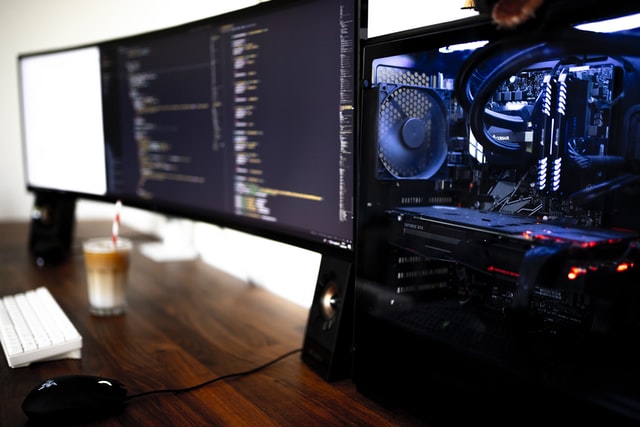Technology is changing business rapidly. You probably use a lot of new gadgets and services now that make work more convenient than just a few years ago. But some technologies go beyond offering more convenience. Some tech is disruptive.
You might’ve seen the phrase “disruptive technology” here and there in different articles. But buzzwords seem to grow and spread as quickly as technology, and in all the hype, you can lose the definition. So what exactly is disruptive technology, and what can it do for your workplace?
Disruptive tech doesn’t just alter a process, but it changes it entirely. It’s technology that replaces the current system because it’s immediately recognizable as superior. Electric lights and TVs were examples of disruptive tech when they first came out.
At today’s rate of advancement, there are more than a few disruptive technologies on the horizon. In the coming years, these technologies will make business an entirely different animal from what it is today.

1. Virtual Assistants
Virtual assistants are already commonplace in home use. From Siri on your iPhone to Alexa in your Amazon Echo, these AI systems mostly help you do things like set reminders or check the weather. But digital assistants are beginning to take off in business with a much more comprehensive range of uses.
Almost all business operations today generate data that AI can measure. With access to this information, virtual assistants can go beyond managing your schedule and help make your business more efficient. They can offer solutions for increased profits, alert you of oncoming changes to anticipate and organize your emails and documents.
Digital assistants are an essential part of business intelligence. All the data you generate is next to useless if you can’t make sense of it, and no one understands digital information better than a machine.
As AI improves, these systems will become all the more useful, and this is happening every day. The very nature of machine learning means these AIs will improve themselves as time goes on. Advanced virtual assistants will be an indispensable tool for all companies before long.
2. Augmented and Virtual Reality
Augmented reality (AR) and virtual reality (VR) have been around in the entertainment industry for a while, but they’re beginning to see use in business. The same factors that make these technologies enticing for video games and movies make them ideal for corporate use. With immersive, controllable virtual environments, companies could revolutionize training.
In a virtual setting, employees can practice skills and techniques in a safe environment. While other training techniques can also provide this security, they can’t match how engaging these systems can be. This marriage of immersion and safety is especially helpful for professions like surgery or engineering.
Studies have shown that medical students operate faster and more accurately when they train with VR. In industries where speed and precision are critical, the advantage of these technologies is impossible to ignore. But the potential of VR and AR doesn’t stop at training.
It’s easier to understand complex data or situations when you can visualize it. The immersion of VR and AR offers unparalleled visualization. You could use these technologies to plot out everything from construction blueprints to new marketing strategies.

3. Cloud Computing
Cloud computing in and of itself is nothing new. You most likely already use the cloud to some extent for both your work and your personal life. But cloud functions are growing, and using them will soon become the norm, not just an option.
Working on the cloud increases flexibility and efficiency while reducing costs. These advantages are what draw people in to use it for things like file sharing, but the cloud offers more now. Soon, you’ll start seeing businesses operate entirely on the cloud instead of using it for limited functions.
Developing cloud technologies like containers and edge computing make the cloud even more secure, fast and accessible. With these features, running your entire business on the cloud might be preferable.
You may be hesitant to increase cloud adoption over security concerns. But cloud computing can be safer than traditional methods with modern security measures. Before long, old-fashioned computing may be a thing of the past.

4. Renewable Energy
As environmental concerns continue to grow, more companies will shift to become more sustainable. While countless factors play into environmentalism, renewable energy stands out as a particularly disruptive part of this movement. The need for electricity won’t go away, but the way companies get this electricity is changing.
Different businesses have used things like solar panels for years, but an increasingly concerned populace has led to a sharp uptake in sustainable practices. As the public begins to hold companies to a higher environmental standard, renewable energy will start to replace fossil fuels.
Modern energy technology makes sustainability more feasible. From advanced battery storage to more efficient means of gathering clean electricity, renewable energy as a whole is changing. As it morphs into something more affordable and more effective, it will become a more enticing prospect for businesses.
As these technologies develop, more businesses will adjust their operations to accommodate them. Renewable energy is shaking up how companies do things and, as such, is a disruptive technology.

5. Robotics
The day when you work beside robots may be closer than you think. You may not see humanoid robots sitting at a desk working on a computer, but automated machines are already collaborating with human workers. You might even have some robots, like an automatic vacuum, in your home.
In some areas, robots will and already are replacing humans entirely. Retail locations like Amazon Go grocery stores use robotic systems instead of cashiers to simplify customers’ shopping experience. Tools like cameras and sensors, combined with robotic tech like machine vision and deep learning, can do the work of a human faster and more correctly.
The disruptive force of robots doesn’t mean you’ll lose your job. Apart from introducing more robots to the workforce, one of the most significant personnel changes will be hiring people comfortable with robot collaboration. Hiring new staff and training existing employees will center on working with these machines.
The increase in robotics will mean a surge in demand for tech-savvy human employees. Even when they don’t replace people, robots are changing the face of the workforce.
6. Behavioral Fingerprinting
With the increase in data sharing worldwide, cybersecurity is becoming a more pressing issue. As a result, tech that offers advanced data security is becoming a necessity. One such advancement that will likely disrupt cybersecurity is behavioral fingerprinting.
Behavioral fingerprinting takes identification beyond passwords and even two-factor authentication. Instead of relying on these factors, it uses AI to identify users’ online behavior and recognize suspicious conduct. Whether you realize it or not, you have a distinct way of doing things online, which these systems can use to point out hackers.
Behavioral fingerprinting can analyze everything from websites you frequent to how much pressure you apply to your phone screen. If someone were to hack into your devices, they wouldn’t behave just like you do. These systems would recognize that and take action to stop the hacker.
The dynamic nature of cybersecurity lends itself to the adoption of disruptive technologies. As more varied and advanced behavioral fingerprinting systems emerge, more companies will prefer them over other methods.
7. AI Sales Forecasting
Customer bases are always changing. Methods that attract clients in one season may be ineffective or even detrimental just a year later. Predicting sales and customer behavior can be challenging, but AI makes it easier.
AI-based sales forecasting gives businesses accurate predictions about coming changes so they can adjust accordingly. With the help of big data analytics, these systems can even offer actionable insights for companies to follow. They take the guesswork out of planning for the future.
AI sales forecasting improves several different business functions. With these insights, companies could form better cold calling strategies or modify their online ad campaigns to be more effective in the coming quarter. If you need to make any more significant changes to avoid substantial loss, AI sales forecasting will let you know.
Data analytics are often superior to humans in predicting future outcomes. The businesses that will survive future markets are those that adopt AI-based forecasting strategies.

8. Blockchain
You might associate blockchain with Bitcoin, but it enables far more processes than just crypto transactions. Most blockchain applications you’ll find today are still cryptocurrency-related, but companies are starting to see its full potential. Blockchain can lead to better productivity for the same reasons that make it a viable financial technology. You can try here set up and buy ethereum with Coin.Cloud.
A blockchain is a decentralized, transparent and unchangeable record of digital information. It categorizes given data as a block that it then organizes in a chain of similar blocks. Anyone can see these blocks, but no one can change them, making them a reliable and secure method of data management.
Companies can use blockchain technology to track product quality as it goes through the supply chain. Any kind of transaction, financial or otherwise, becomes far more secure when running on a blockchain. Businesses could attract customers by the promise of unhackable and transparent exchanges.
By adopting blockchains, companies take another step toward security. Their decentralized nature also means that businesses could save money by making the switch to blockchain, since they’d avoid third-party charges.
9. Secure Digital Communication
Any successful operation requires thorough communication, even when co-workers are miles apart. Digital communication like instant messaging disrupted the business world years ago, but with growing cyber-threats, new communication methods could result in further upheavals. Companies today and in the immediate future are looking for secure digital messaging systems.
With encrypted telecommunication services, businesspeople could discuss sensitive information without worrying about it leaking. The convenience of online communication may not be worth the risk of a data breach. But with secure servers, this wouldn’t be an issue.
Avoiding talking to your colleagues is not an option. You need to communicate with your company, but you also need to keep private data safe. Secure digital communication services allow you to operate comfortably within both requirements.

10. The Internet of Things(IOT)
At this point, you’ve most likely heard people talk about the Internet of Things (IoT). More and more devices become part of this vast network nearly every day, and businesses can no longer ignore its potential. The more objects a company brings into the IoT, the more it has to gain.
With a connected office, you could control everything from the lights to break room appliances from your phone or computer. This connectivity and ease of use allow you to streamline a variety of day-to-day processes. When you don’t have to spend as much time on these small things, you have more time to focus on essential work.
The IoT also improves other disruptive technologies. The more connected devices your company uses, the more robust insights things like virtual assistants can offer you. Every IoT device is a measurable data point, so you build a more extensive data pool as you grow your local IoT.
The Internet of Things is already all around you. Incorporating it into your business is not an especially challenging or inconvenient process. Widespread IoT adoption is a virtually guaranteed change to come.
The Workplace of Tomorrow
These 10 disruptive technologies are only a sample of the changes awaiting business in the future. This tech may be new now, but in just a few years, it will be widespread and even commonplace. After all, a disruptive technology is one that becomes the new normal.
Before long, you’ll see virtual assistants, robots, blockchains and IoT devices everywhere you look. Technology is moving at a faster rate now than it ever has before, so the modern workplace is also evolving rapidly. Just as it won’t be long before these technologies take over the workplace, new ones will disrupt the same industries soon after that. Change is one of the few constants in both business and technology. If you expect your business to succeed, stay adaptive, flexible and abreast of these issues.
